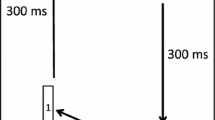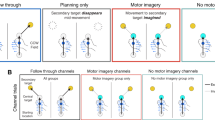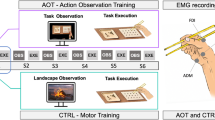Abstract
Observation contributes to motor learning. It was recently demonstrated that the observation of both a novice and an expert model (mixed observation) resulted in better learning of a complex spatiotemporal task than the observation of either a novice or an expert model. In experiment 1, we aimed to determine whether mixed observation better promotes learning due to the information that can be gained from two models who exhibit different skill levels or simply because multiple models, regardless of their level of expertise, better promote learning than would a single model. The results revealed that the observation of both an expert and a novice model resulted in better short-term retention than the observation of either two novice or two expert models. In experiment 2, we wanted to determine whether these benefits would last longer if physical practice trials were interspersed with observation. Mixed and (to some extent) expert observations resulted in better long-term retention than observation of a novice model. We suggest that alternating mixed/expert observation with physical practice trials makes one’s error more salient than when all observation trials are completed before one first starts performing the experimental task, which increases activation of the action observation network.




Similar content being viewed by others
Notes
The naturally emerging relative timing used by individuals was determined in a pilot study. Specifically, three participants who did not take part in the present study were asked to complete the task in a TMT of 1,200 ms for 60 trials; no constraints were imposed on ITs. Participants received feedback only on TMT following each trial. Twenty practice trials allowed the participants to approach the goal TMT of 1,200 ms. Data from the remaining 40 trials revealed a stable relative timing pattern both within individuals and among different participants (the within- and between-participant variability fluctuated between 1.0 and 2.4 %; see also Blandin et al. 1999).
The films of the first 10 participants in this study were independently rated by one of the authors (M.A.) and by the research assistant, which yielded a coefficient of reliability (Cronbach’s alpha) of 0.852.
In further support of this proposition, we had two additional groups observe either one novice model or one expert model. We contrasted their performance with that of the O2N and O2E groups in a three phases (pretest, 10-min retention, and 24-h retention) × two types of models (Novice vs. Expert) × two numbers of models (1 vs. 2) ANOVA. The variable error of TMT was significantly lower in either retention test for the participants who observed either one or two expert models than for those who observed novice model(s). This finding was the only significant difference relative to the type or number of models or any interaction involving these factors.
The results of a supplementary analysis in which we contrasted the performance in the 10-min retention test of the three observation groups of experiment 1 to that of the three observation groups in experiment 2 revealed a significantly smaller RMSE in experiment 2 than in experiment 1, F (1, 72) = 20.9.
The results of a supplementary analysis in which we contrasted the RMSE in the 24-h retention test of the three observation groups in experiment 2 to that of the physical practice group in experiment 1 revealed a significant main effect of group, F (3, 42) = 2.84, p = .049. Post hoc comparisons revealed that the MO + PP group had a significantly lower RMSE than the PP group (p = .02), whereas a similar trend was observed between the O1E + PP group and the PP group (p = .09); no difference was noted between the O1N + PP group and the PP group (p = .90).
References
Al-Abood SA, Davids KF, Bennett SJ (2001) Specificity of task constraints and effects of visual demonstrations and verbal instructions in directing learners’ search during skill acquisition. J Motor Behav 33:295–305. doi:10.1080/00222890109601915
Badets A, Blandin Y (2004) The role of knowledge of results frequency in learning through observation. J Motor Behav 36:62–70
Badets A, Blandin Y (2010) Feedback schedules for motor-skill learning: the similarities and differences between physical and observational practice. J Motor Behav 42:257–268. doi:10.1080/00222895.2010.497512
Badets A, Blandin Y, Wright DL, Shea CH (2006) Error detection processes during observational learning. Res Q Exercise Sport 77:177–184
Bandura A (1986) Social foundations of thought and action: a social cognitive theory. Prentice-Hall
Bird G, Heyes C (2005) Effector-dependent learning by observation of a finger movement sequence. J Exp Psychol Hum Percept Perform 31:262–275. doi:10.1037/0096-1523.31.2.262
Black CB, Wright DL (2000) Can observational practice facilitate error recognition and movement production? Res Q Exercise Sport 71:331–339
Blandin Y, Proteau L (1997) On the cognitive processes involved in the contextual interference effect. J Hum Mov Stud 32:211–233
Blandin Y, Proteau L (2000) On the cognitive basis of observational learning: development of mechanisms for the detection and correction of errors. Q J Exp Psychol A-Hum Exp Psychol 53:846–867
Blandin Y, Proteau L, Alain C (1994) On the cognitive processes underlying contextual interference and observational learning. J Motor Behav 26:18–26. doi:10.1080/00222895.1994.9941657
Blandin Y, Lhuisset L, Proteau L (1999) Cognitive processes underlying observational learning of motor skills. Q J Exp Psychol A Hum Exp Psychol 52:957–979
Brown LE, Wilson ET, Obhi SS, Gribble PL (2010) Effect of Trial Order and Error Magnitude on Motor Learning by Observing. J Neurophysiol 104:1409–1416. doi:10.1152/jn.01047.2009
Buccino G, Binkofski F, Fink GR et al (2001) Action observation activates premotor and parietal areas in a somatotopic manner: an fMRI study. Eur J of Neurosci 13:400–404
Buchanan JJ, Dean NJ (2010) Specificity in practice benefits learning in novice models and variability in demonstration benefits observational practice. Psychol Res 74:313–326. doi:10.1007/s00426-009-0254-y
Buchanan JJ, Ryu YU, Zihlman K, Wright DL (2008) Observational practice of relative but not absolute motion features in a single-limb multi-joint coordination task. Exp Brain Res 191:157–169. doi:10.1007/s00221-008-1512-8
Cisek P, Kalaska JF (2004) Neural correlates of mental rehearsal in dorsal premotor cortex. Nature 431:993–996. doi:10.1038/Nature03005
Collier GL, Wright CE (1995) Temporal rescaling of sample and complex rations in rhythmic tapping. J Exp Psychol Hum Percept Perform 21:602–627
Cross ES, Kraemer DJM, Hamilton AFD, Kelley WM, Grafton ST (2009) Sensitivity of the Action Observation Network to Physical and Observational Learning. Cereb Cortex 19:315–326. doi:10.1093/cercor/bhn083
Cross ES, Liepelt R, Hamilton AFD, Parkinson J, Ramsey R, Stadler W, Prinz W (2012) Robotic movement preferentially engages the action observation network. Hum Brain Mapp 33:2238–2254. doi:10.1002/Hbm.21361
Deakin JM, Proteau L (2000) The role of scheduling in learning through observation. J Motor Behav 32:268–276
Dushanova J, Donoghue J (2010) Neurons in primary motor cortex engaged during action observation. Eur J of Neurosci 31:386–398. doi:10.1111/j.1460-9568.2009.07067.x
Ellenbuerger T, Boutin A, Blandin Y, Shea CH, Panzer S (2012) Scheduling observational and physical practice: influence on the coding of simple motor sequences. Q J Exp Psychol 65:1260–1273. doi:10(1080/17470218),2011,654126
Ferrari M (1996) Observing the observer: self-regulation in the observational learning of motor skills. Dev Rev 16:203–240
Frey SH, Gerry VE (2006) Modulation of neural activity during observational learning of actions and their sequential orders. J Neurosci 26:13194–13201. doi:10.1523/Jneurosci.3914-06.2006
Gallese V, Fadiga L, Fogassi L, Rizzolatti G (2002) Action representation and the inferior parietal lobule. Common Mech Percept Action 19:334–355
Grafton ST, Fadiga L, Arbib MA, Rizzolatti G (1997) Premotor cortex activation during observation and naming of familiar tools. Neuroimage 6:231–236
Hayes SJ, Elliott D, Bennett SJ (2010) General motor representations are developed during action-observation. Exp Brain Res 204:199–206. doi:10.1007/s00221-010-2303-6
Heyes CM, Foster CL (2002) Motor learning by observation: evidence from a serial reaction time task. Q J Exp Psychol A 55:593–607. doi:10.1080/02724980143000389
Hodges NJ, Chua R, Franks IM (2003) The role of video in facilitating perception and action of a novel coordination movement. J Motor Behav 35:247–260. doi:10.1080/00222890309602138
Hodges NJ, Williams AM, Hayes SJ, Breslin G (2007) What is modelled during observational learning? J Sport Sci 25:531–545. doi:10.1080/02640410600946860
Koelewijn T, van Schie HT, Bekkering H, Oostenveld R, Jensen O (2008) Motor-cortical beta oscillations are modulated by correctness of observed action. Neuroimage 40:767–775. doi:10.1016/j.neuroimage.2007.12.018
Lee TD, Magill RA (1983) The Locus of Contextual Interference in Motor-Skill Acquisition. J Exp Psychol Learn 9:730–746. doi:10.1037//0278-7393.9.4.730
Lee TD, White MA (1990) Influence of an unskilled models practice schedule on observational motor learning. Hum Mov Sci 9:349–367. doi:10.1016/0167-9457(90)90008-2
Lee TD, Swinnen SP, Serrien DJ (1994) Cognitive effort and motor learning. Quest 46:328–344
Martens R, Burwitz L, Zuckerman J (1976) Modeling effects on motor-performance. Res Q 47:277–291
Mattar AAG, Gribble PL (2005) Motor learning by observing. Neuron 46:153–160. doi:10.1016/j.neuron.2005.02.009
McCullagh P, Caird JK (1990) Correct and learning models and the use of model knowledge of results in the acquisition and retention of a motor skill. J Hum Mov Stud 18:107–116
McCullagh P, Meyer KN (1997) Learning versus correct models: influence of model type on the learning of a free-weight squat lift. Res Q Exercise Sport 68:56–61
McCullagh P, Weiss MR, Ross D (1989) Modeling considerations in motor skill acquisition and performance: an integrated approach. Exerc Sport Sci Rev 17:475–513
Ong NT, Hodges NJ (2012) Mixing it up a little. How to schedule observational practice. In: Hodges NJ, Williams M (eds) Skill Acquisition in Sport: Research, Theory and Practice, 2nd edn. Routledge, London, pp 22–39
Pollock BJ, Lee TD (1992) Effects of the model’s skill level on observational motor learning. Res Q Exercise Sport 63:25–29
Rohbanfard H, Proteau L (2011) Learning through observation: a combination of expert and novice models favors learning. Exp Brain Res 215:183–197. doi:10.1007/s00221-011-2882-x
Schmidt RA, Lee TD (2011) Motor control and learning: a behavioral emphasis, 5th edn. Human Kinetics, Champaign
Shea JB, Morgan RL (1979) Contextual Interference Effects on the Acquisition, Retention, and Transfer of a Motor Skill. J Exp Psychol Human 5:179–187. doi:10.1037/0278-7393.5.2.179
Shea CH, Wright DL, Wulf G, Whitacre C (2000) Physical and observational practice afford unique learning opportunities. J Motor Behav 32:27–36. doi:10.1080/00222890009601357
van Schie HT, Mars RB, Coles MGH, Bekkering H (2004) Modulation of activity in medial frontal and motor cortices during error observation. Nat Neurosci 7:549–554. doi:10.1038/Nn1239
Vogt S, Thomaschke R (2007) From visuo-motor interactions to imitation learning: behavioural and brain imaging studies. J Sport Sci 25:497–517. doi:10.1080/02640410600946779
Weeks DL, Anderson LP (2000) The interaction of observational learning with overt practice: effects on motor skill learning. Acta Psychol 104:259–271
Wulf G, Mornell A (2008) Insights about practice from the perspective of motor learning: a review. Music Perform Res 2:1–25
Acknowledgments
This work was supported by a Discovery Grant (L.P.) provided by the Natural Sciences and Engineering Research Council of Canada.
Author information
Authors and Affiliations
Corresponding author
Rights and permissions
About this article
Cite this article
Andrieux, M., Proteau, L. Observation learning of a motor task: who and when?. Exp Brain Res 229, 125–137 (2013). https://doi.org/10.1007/s00221-013-3598-x
Received:
Accepted:
Published:
Issue Date:
DOI: https://doi.org/10.1007/s00221-013-3598-x




